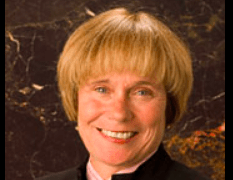As a struggling actress in a dinner theatre, Betsy Duke needed a second job. She got a part-time waitressing job but the dry cleaner where she applied didn’t hire her, so she settled for a part-time job as a teller at a local bank. And the rest of her life began. She became so enamored with banking that she supplemented her bachelor’s degree in drama with an MBA at Old Dominion University and kept moving up the ladder.
I believe the work women learn in their homes makes them good candidates for management positions. They learn to multi-task to the max and are able to handle the complexity and pressure of managing others. Likewise, they learn to clean up messes and Betsy Duke has helped clean up plenty of them.
When Betsy Duke’s business partner died suddenly, she took over management of the Bank of Tidewater. It was 1991 and almost a third of the savings and loans in the United States failed. Duke acquired failing branches and grew her bank’s position.
In 2008 Duke joined the Federal Reserve board. She warned that lenders didn’t have enough capital on hand, but Lehmann Brothers fell before adequate action had been taken. She was left to assist the Federal Reserve in righting the financial ship.
Now she has taken the helm of Wells Fargo Bank, the world’s second-largest bank in market capitalization and the third-largest in assets in the U.S. The problem is that Wells Fargo was caught in a public scandal several years ago, opening accounts for “customers” who had not requested them–another mess Duke must attempt to clean up.
Being a woman at the top is never a cakewalk but Duke has additional burdens. First of all, she does not automatically have the support of some other powerful women. Both Senator Elizabeth Warren of Massachusetts and Representative Maxine Waters of California have criticized the choice of Duke to run Wells Fargo. They argue that Duke had been on the Board of Wells Fargo and that leadership should have come from outside the institution.
Since Duke was only on the board a short time, and came on the board after the scandal, this argument does seem to be a bit overblown. If the past is an example, Duke will not let this criticism deter her. She will do the job she was hired to do and she will do another job as well.
Duke has not always embraced an obligation to be a role model for other women. When she became president of the American Bankers Association in 2004, the First Woman heading the organization in its then 129-year history, she downplayed her gender. She did not want others to think being a woman had any part in her obtaining the position. Now she regrets that choice and is committed to seeing herself as an example for other women. “It’s really important,” she says, “to embrace being a role model of high-visibility positions for women.”

